Heracles
Heracles (Ἡρακλἣς) was the mightiest and most famous of the Greek heroes. Heracles was the son of Zeus and Alcmene. The Romans identified him as Hercules. In fact, modern scholars preferred to use his Latin name rather than the original Greek name. His name (Hercules) became synonymous for prodigious strength, courage or size, eg. Herculean.
In the Etruscan mythology, his name was Hercle. Instead of being a son of a mortal woman Alcmene, both of his parents were immortal. He was the son of Tin or Tinia and of Uni. Tin was identified with the Roman Jupiter or the Greek Zeus, while Uni was Tin's wife and consort, who happened to be the Etruscan equivalent of the Roman Juno or the Greek Hera.
His deeds were fabulous for their courage and strength, which he displayed in performing them. His strength and courage, while he was performing the Twelve Labours and aiding the gods in their war against the Giants, earned him immortality and a life among the gods at Olympus.
Yet, his strength would also cause him trouble, especially when he experienced one of his sudden and extremely frightening outbursts of rage that could have tragic consequences to those who happened to be near him. Though after the rage had passed, he showed a great deal of remorse and guilt, and would humbly submit to any punishment inflicted upon him. No other hero submitted to so many punishments. He would even submit to punishment that most heroes would find too degrading, such as cleaning stables or serving as a slave to a queen, who made him wear an effeminate dress. Without his consent, no one would have been able to punish him.
His stepmother Hera had always made Zeus' other lovers and children suffer for her husband's infidelities, but none were persecuted more at the hand of the goddess than Heracles.
Later writers tend to show Heracles in a more unflattering and comical light, yet his name and his deeds were immortalised through timeless myths.

First Labour (Nemean Lion)

Second Labour (Hydra)

Third Labour (Cerynitian Hind)
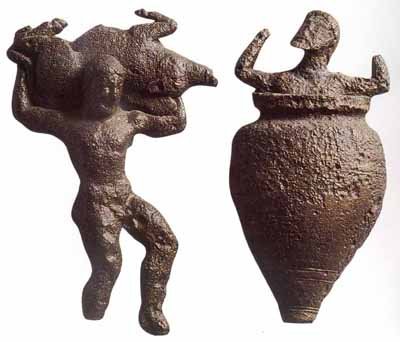
Fourth Labour (Erymanthian Boar)
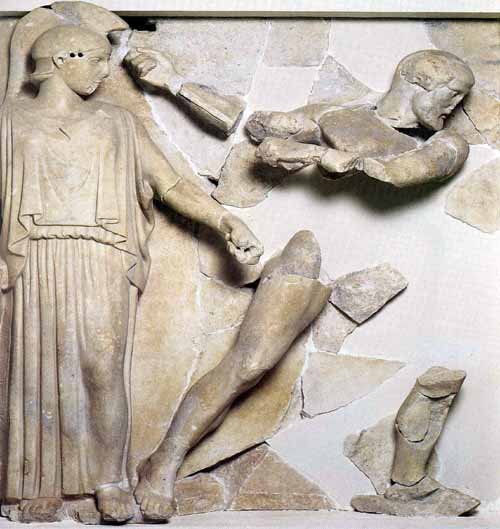
Fifth Labour (Stables of Augeias)
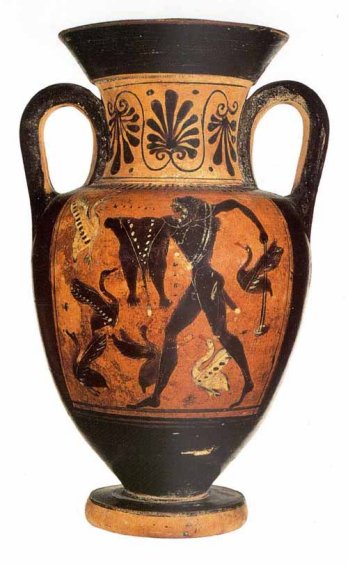
Sixth Labour (Stymphalian Birds)
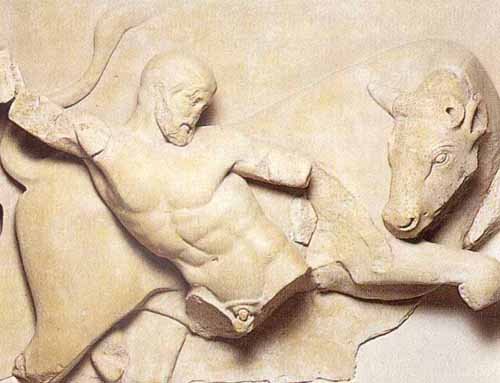
Seventh Labour (Cretan Bull)
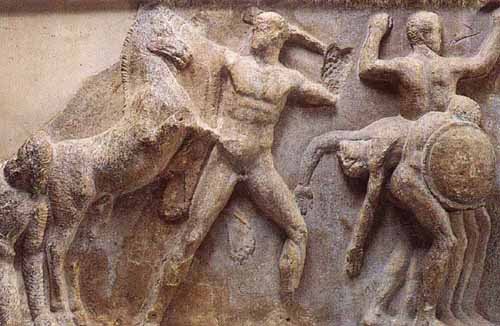
Eighth Labour (Mares of Diomedes)

Ninth Labour (Hippolyte's Girdle)
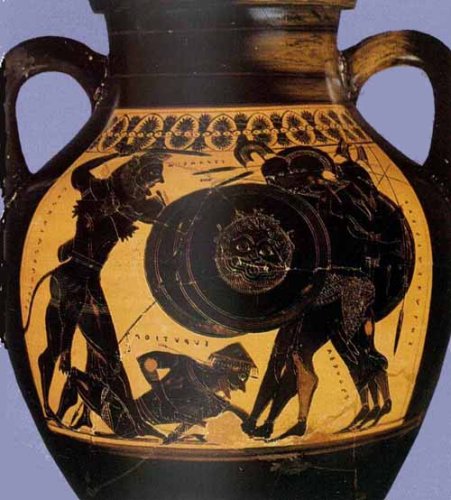
Tenth Labour (Cattle of Geryon)
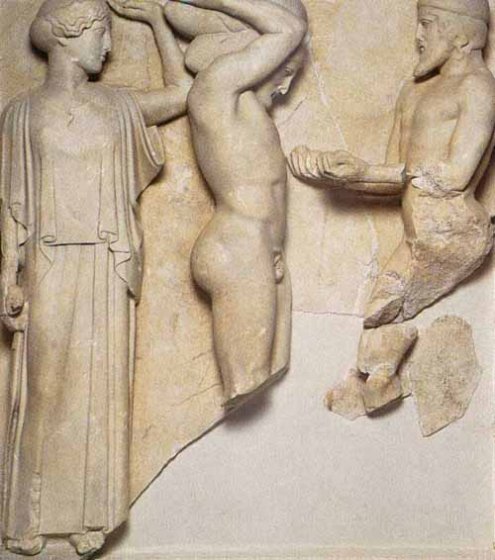
Eleventh Labour (Apples of Hesperides)

Twelfth Labour (Cerberus)
Birth & Early Life
Birth of Heracles
Alcmene (Ἀλκμόνη) was the daughter of Electryon, king of Tiryns, and Anaxo. She married Amphitryon (Ἀμφιτρόων), son of Alcaeüs (Alcaeus).
According to the Shield of Heracles, Electryon's death was no accident; Amphitryon violently killed the king, because he was angry over some oxen.

Heracles and Iphicles
(Heracles strangling two
snakes in the crib)
Red figure pottery, 470 BC
Musée du Louvre, Paris
While Apollodorus says that Electryon's death was an accident. Taphians had raided the cattle from Electryon's pastures. Electryon's nine sons went to retrieve the stolen cows, but the sons of Electryon and the sons of Taphius killed one another in a battle. Electryon had gone on an expedition with Amphitryon to avenge his sons' death and recapture his cattle. Electryon had made Amphitryon promise not to have sex with his new wife until they returned from the expedition.
They had recovered the cattle from the Teleboans, when a bull had suddenly charged at the king and his newly married son-in-law, Amphitryon. Amphitryon had tried to defend himself, swinging his heavy club at the bull, but the weapon had rebounded off the horn, hitting the king in the head. According to Shield of Heracles, Hesiod says that it was no accident. Apparently Electryon and Amphitryon had an argument over some oxen.
Sthenelus took advantage of his brother's death, seizing power and exiling his nephew Amphitryon. Alcmene and her half-brother Licymnius fled with Amphitryon to Thebes.
At this time, Creon was king of Thebes, after the death of Laius. Creon purified Amphitryon for the killing the king and gave his daughter Perimede in marriage to Licymnius. According to Pausanias, Amphitryon and Alcmene lived near the Electran Gate, one of the seven gates of Thebes.
Alcmene remained faithful to her brothers' memory by refusing to lay with her husband until he avenged them against Taphian pirates. With Creon's aid, Amphitryon successfully led a campaign against the Taphians, but before his return, Zeus visited Alcmene in her husband's form and shared her bed.
Upon Amphitryon's return, he slept with Alcmene, but discovered that she was no longer a virgin. The Theban seer Teiresias cleared up the mystery - that she was visited by a god and not to blame for losing her virginity prematurely.
Nine months after Zeus' visit, Zeus boasted that a day had come where a child would be born with his lineage that would rule the land around him. The goddess Hera's implacable hatred for all of Zeus' children fathered with mortal women made him swear that it would be so.
No sooner Zeus had sworn this vow than Hera arranged with her daughter Eileithyia, goddess of childbirth, to delay the delivery of Alcmene. Eileithyia sat outside of the room where Alcmene was in labour. By sitting with her legs crossed and fingers intertwined, Eileithyia prevented Alcmene from pushing the babies out of her womb for seven agonizing days.
Hera saw to it that Sthenelus' son Eurystheus was born before Heracles. Eurystheus was born prematurely. Therefore, Eurystheus would be king of Mycenae and Tiryns. Zeus was furious with Hera but could not revoke his vow.
Alcmene might have died in childbirth had not an attendant Galanthis tricked Eileithyia into thinking that the child have been delivered, surprising the goddess who had been holding back the delivery. Galanthis paid a high price for loyalty to Alcmene when she tricked the goddess of childbirth. Eileithyia transformed Galanthis into a weasel. Alcmene bore twins, Heracles (Ἡρακλἣς) and Iphicles (Ἴφικλης); the second was a son of Alcmene by Amphitryon.
Alcaeüs was the name given to Heracles at birth (Heracles was named after his grandfather; Heracles didn't change his name until he went to Delphi for the first time).
According to Pausanias, the room that Alcmene gave birth to Heracles was called Alcmene's Chamber. His version about the hero's birth was slightly different from the usual account. Pausanias says that Hera had sent the Witches to delay or prevent Alcmene from giving birth, not Eileithyia. Also it was Historis, Teiresias' daughter, who tricked the Witches, not Alcmene's servant Galanthis.
Having failed to prevent the birth, the goddess sent two snakes to kill the infants in their crib. Iphicles screamed in terror, but Heracles strangled both snakes, one in each hand. Amphitryon realised that Iphicles was his child, but Heracles belonged to the god. Other writers say that Amphitryon himself sent the snakes to the infants' room to identify which child belonged to the god.
According to Diodorus Siculus, Alcmene, fearing Hera's wrath, abandoned her infant in the woods. Athena rescued the infant and brought the baby to Hera. Athena managed to persuade or dupe Hera into nursing the infant. Hera allowed the baby (Heracles) to suckle on one of her breasts, until the child bit very hard on her nipple. The goddess pushed the baby away from her nipple, spilling her milk across the heaven, forming the Milky Way. (So that was how this galaxy was created!)
The goddess told Athena to give the baby back to her mother to nurse. Athena returned child back to Alcmene, telling the mother to rear her own child. The irony of this situation is that Hera had actually saved her hated stepson's life by breast feeding him from her own breast.
Related Information
Name
Heracles, Herakles, Ἡρακλἣς – "Glory of Hera" (Greek).
Hercules (Roman).
Alcaeüs, Alcaeus, Ἀλκάεος (Greek; birth name).
Hercle (Etruscan)
Sources
Library was written by Apollodorus.
Metamorphoses was written by Ovid.
Iliad was written by Homer.
The Shield of Heracles was ascribed to Hesiod.
Heracles or Madness of Heracles were written by Euripides.
Library of History was written by Diodorus Siculus.
Nemean I, Nemean X and Pythian IX were written by Pindar.
Related Articles
Zeus, Hera, Alcmene, Amphitryon, Electryon, Eurystheus.
Genealogy: House of Perseus.
Early Life
At some point of his young life, his name was changed from Alcaeus to Heracles (Ἡρακλἣς), which means Glory of Hera. The name meant that he would obtain glory through Hera's enmity.
Many famous men were involved with his education. Amphitryon taught Heracles how to drive a chariot and Castor trained him in fencing, while the thief Autolycus, the son of Hermes, taught him how to wrestle. Another son of Hermes, Harpalycus of Phanotè, trained him in boxing. Eurytus, king of Oechalia, taught him archery. and Linus, son of the Muse Calliope or Urania, taught Heracles music. According to Theocritus, it was Eumolpus, son of Philammon, who taught the young hero play the lyre, as well as how to sing.
Teaching him music ended up in disaster when his teacher Linus struck the youth for his poor attention to music lessons. Heracles retaliated by striking him in the head with the lyre, killing Linus instantly. Heracles was acquitted of murder, but Amphitryon sent him to tend sheep on the farm in the countryside near Thespiae, to keep him out of trouble.
Here, at the foot of Mount Cithaeron, he killed a lion without a weapon that was killing flocks of Thespius, king of Thespiae. The king was so impressed by his feat that Thespius entertained the youth as his guest for fifty nights. Each night Thespius would send one of his fifty daughters to the hero's room. Other writers say that he slept with all the king's daughters in a single night. Only one of Thespius' daughters refused to sleep with Heracles. Two of the girls bore twins to Heracles, and Heracles had a total of fifty-one sons. After Heracles' death, these sons migrated to the island of Sardinia.
Related Information
Name
"Glory of Hera"
Heracles, Herakles; Alcaeüs, Alcaeus.
Hercules (Roman).
Sources
Library was written by Apollodorus.
Theogony was written by Hesiod.
The Shield of Heracles was possibly written by Hesiod.
Heracles or Madness of Heracles were written by Euripides.
Idylls was written by Theocritus.
Related Articles
Zeus, Hera, Alcmene, Amphitryon, Electryon, Eurystheus, Castor, Autolycus.
Genealogy: Perseids.
Later Life
Freedom From Servitude
Death of Iphitus
Having performed all twelve labours, Heracles was now free from any more obligations to Eurystheus. He was left to his own devices. Eurytus (Εὐρυτίων), king of Oechalia, offered his daughter's hand in marriage (Iole, Ἰόλη), if one of the suitors could defeat him or his sons in an archery contest. While Heracles was receiving education, Eurytus had taught archery to the young Heracles, which the king was soon to regret.
Heracles won the competition, but Eurytus refused to give his daughter away. Eurytus was afraid that Heracles might kill his daughter as the hero had killed his sons in madness. To make matter worse, some of his cattle were stolen by Autolycus, the master thief, but Eurytus accused Heracles of the theft.

Apollo and Heracles Fights
Over the Tripod of Delphi
Attic hydria with black figures
of the Painter of Madrid. c.
510 BC Museo Arqueológico
Nacional, Madrid
Heracles left Oechalia in anger, while Eurytus' son Iphitus (Ἰφιτος) tried to persuade his father that the hero had won Iole's hand fairly. Eurytus banished his own son from his kingdom. Iphitus went to talk Heracles out of waging a war against his father, but Heracles, again possibly struck by madness caused by Hera, murdered Iphitus in Tiryns.
(According to Homer, Eurytus died young, when he challenged Apollo to an archery contest. Eurytus lost to Apollo and the god killed him for challenging him. Also Iphitus was alive and gave his father's bow to the hero Odysseus. Later, Iphitus was killed by Heracles who took Iphitus' horses.)
He tried to get Neleus, king of Pylus and then later Hippocoön (Hippocoon), king of Sparta, to purify him for the murder of Iphitus, but both kings refused. These two kings became his mortal enemies.
A terrible disease then struck Heracles. He sought advice from Xenocleia, the current Pythia of Delphi, to help cure his disease, but she refused to give advice.
Heracles angrily took the tripod and told her he would set up his own oracle. Apollo came to his priestess' aid and would have fought Heracles, had not Zeus separated the two with a thunderbolt.
Heracles just wanted advice from the oracle, not a fight with Apollo. Apollo felt admiration for Heracles' boldness, and the god ordered his priestess to respond to the hero's request. The oracle told Heracles that he must sell himself as a slave, as punishment for the murder and a cure for his disease.
Slave of Omphale
Hermes made the arrangement to sell Heracles. Heracles was sold to Omphale (Ὀμφάλη), daughter of Iardanes and queen of Lydia. Omphale had become queen after the death of her husband, Tmolus. All the gold from the transaction was given to Eurytus as compensation for the murder of the king's son, though Eurytus refused to accept it.
She made him dress in women's clothing and do needlework with the other ladies. However, Apollodorus never wrote anything about the hero being made to wear women's clothing; it was only found in Roman sources like Statius' Achilleid and Ovid's Heroides and Fasti.
According to Fasti, Faunas, a woodland god and follower of Pan and Dionysus, tried to rape Omphale. He entered the chamber at night and felt woman's silken garment. Faunas was astonished to feel hairy bottoms, when he lifted what he thought was the queen's garment. Before he could penetrate the supposed queen, Heracles immediately woke and pushed Faunas so hard that the god couldn't get up. When Heracles and Omphale could finally see the intruder in the light, they laughed at the embarrassed god. It was for this reason that he wanted all his followers to come to his rites naked.
She freed the hero after three years of slavery, after a number of services.
Heracles captured and killed the Cercopes at Ephesus. The Cercopes were said be dwarfish monkey-like or ape-like men. They were renowned for their knavery, according to a short fragmented poem named after them, The Cercopes. Their names were Passalus and Acmon, and they were the sons of Oceanus and Theia. Theia was a daughter of Memnon, an unknown figure. Theia warned her troublesome sons to avoid Blackbottom. They were captured in Thessaly by Heracles. He had them tied and hanging upside-down on a pole, which Heracles was carrying over his shoulder. From this angle, they could see this person was the one their mother warned them about - Blackbottom. They laughed and joked about Heracles' hairy bottoms. Far from being offended, Heracles released them. Zeus would later turn them into stone because they were trying to deceive the god.
At Aulis, Syleus and his daughter Xenodice forced travellers to hoe Syleus' vineyard; the hero killed both father and daughter. He also captured and razed the city, Itoni. And lastly, according to Hyginus in Poetic Astronomia, Heracles killed a giant serpent for Omphale that inhabited the river Sagaris and had been killing Lydians near the water.
Heracles was said to have renamed the island of Doliche to Icaria after finding the body of Icarus, a son of Daedalus. Daedalus was an Athenian inventor, formerly in the services of Minos, king of Crete.
Queen Omphale married Heracles and had a son named Lamus. Heracles left Lydia shortly after this, to continue his adventures.
Related Information
Sources
Library was written by Apollodorus.
The Odyssey was written by Homer.
Cercopes was one of the works in the Epic Cycle.
Description of Greece was written by Pausanias.
Library of History was written by Diodorus Siculus.
Fasti was written by Ovid.
Fabulae and the Poetica Astronomica were written by Hyginus.
Contents
Troy
Once freed from slavery to Omphale, Heracles gathered an army to capture Troy and was joined by the hero, Telamon, son of Aeacus. At this time, Telamon was expecting a baby from his wife, Eeriboea. Heracles prayed to his father that Telamon's son would be brave. Zeus sent an eagle as a sign of accepting his prayer. Telamon named his son Aias (Ajax) after the eagle (aietos). Aias became one of the leading warriors who fought in the Trojan War.
Laomedon refused to pay him, when Heracles rescued Hesione from the sea monster. Heracles vowed vengeance. Poseidon and Apollo had to build the wall around much of Troy, making it quite impregnable. The only weakness in the wall were sections built by Aeacus, Telamon's father. It was most likely that Telamon knew where the weaknesses were.
Landing in Troy with eighteen ships, they set about attacking Troy. It was Telamon who broke through the wall (the part built by his father), leading the attack against the Trojans. Heracles felt insulted and jealous that Telamon would breach the wall before him.
The hero would have killed his lieutenant, had Telamon not had the foresight to stop fighting and start piling stones. When the hero asked what Telamon was doing, Telamon replied that he was building an altar to Heracles. Heracles forgot his anger since Telamon had flattered his vanity.
Laomedon and all his sons but the youngest, Podarces (Priam), were killed in the fighting. Heracles allowed Hesione to ransom only one of the captives. Hesione ransomed Podarces by giving up one of her veils. Hesione was given to Telamon as a concubine, while Podarces stayed behind in Troy, succeeded his father, and changed his name to Priam.
(According to Diodorus Siculus, Heracles' war at Troy was set on his return journey from Colchis, during Jason's quest for the Golden Fleece. See Argonauts, Diodorus' Version.)
As Heracles sailed with his ships to return home, Hera sent a violent storm that left Heracles stranded in Cos. This action angered her husband so much that Zeus bound Hera by the wrists, hanging from the heights of Olympus.
The Coans thought the Greeks were pirates so they attacked them. The Greeks took the city. Heracles killed their king, Eurypylus, but the Coan champion, Chalcodon, wounded the hero. Zeus rescued and spirited his son safely away, where Heracles was healed of his wounds.
Related Information
Sources
Library was written by Apollodorus.
Metamorphoses was written by Ovid.
The Iliad was written by Homer.
Great Eoiae was possibly written by Hesiod.
Description of Greece was written by Pausanias.
Nemean III, Nemean IX and Isthmian VI were written by Pindar.
War of the Giants
While the god healed him, he was brought to Phlegra in Thrace (some say in Sicily), where the gods were warring against the Giants (Gigantes), who had been spawned by the blood of the castrated Uranus that fell to the earth (Gaea). In order to defeat the Giants, the gods required - by the oracle - the help of a mortal hero.
Heracles killed Alcyoneus by shooting the giant with his lethal arrow before dragging its body outside of Pallene, where the giant was mortal. Apollo and Heracles each shot one eye of Ephialtes with their arrows.
Athena killed Pallas and flayed the giant, using its hide for her shield. Athena also killed Enceladus, who had fled west. She crushed Enceladus by throwing the island of Sicily on top of him. Poseidon did the same thing to Polybotes, crushing the giant with the island of Nisyrus.
With Zeus' help, Heracles even killed Porphyrion, who had tried to rape Hera; the same goddess who had incessantly persecuted Heracles even before his birth.
By virtue of the twelve labours that Heracles had performed as well as aiding the gods in this war, Heracles had earned his place among the gods in Olympus.
Related Information
Sources
Library was written by Apollodorus.
Metamorphoses was written by Ovid.
Description of Greece was written by Pausanias.
Nemean I and Isthmian Odes were written by Pindar.
Library of History was written by Diodorus Siculus.
Wars in Peloponnesus
War in Elis
Returning to Greece, Heracles attacked Augeias (Αὐγείας), the king of Elis, with his army from Tiryns. Earlier, Augeias had refused to honour his agreement and pay the promised fee to the hero during Heracles' fifth labour, so the hero had vowed to capture Elis. See the Fifth Labour of Heracles.
But Heracles' army suffered a defeat at the hand of Augeias' allies, Amarynceus and the Moliones (Μολιοίδαι), (Siamese) twin sons of Actor. Heracles might have lost the battle because he was ill at the time. Heracles' half-brother Iphicles might have died in this war or else Iphicles was killed in the war against Sparta.
Heracles returned to Tiryns to raise a new army, only to be banished by his weak cousin Eurystheus, because the king thought and feared that Heracles was raising an army against him. Heracles settled in Pheneüs (Pheneus), Arcadia.
Later, during the Isthmian games, Heracles ambushed and killed the Moliones. Augeias could not defend his kingdom on the second invasion when Heracles raised a new army in Arcadia, possibly killing the king.
Heracles then set the exiled son of Augeias, named Phyleus, to the throne of Elis. According to Apollodorus, Heracles was also said to have established the Olympic Games though the founder was usually said to be Heracles the Dactyl from Mount Ida, Crete. Heracles set a shrine for the Olympian gods, as well as a smaller shrine to Pelops who was his great-grandfather.
War in Pylos
Heracles next attacked Pylus (Πύλας). Here, Hera took Neleus' side and was wounded by Heracles. Hades and Ares also aided Pylus; Heracles wounded both gods during the battle.
Heracles killed eleven of the twelve sons of Neleus as well as the king himself. Heracles encountered Periclymenus (Περικλύμενος), eldest son of Neleus (Νηλεύς). Periclymenus was given the ability by his grandfather (Poseidon) to change his shape. Periclymenus attacked Heracles as a lion, a snake and a bee. When Periclymenus changed himself into the form of an eagle, Heracles finally shot him down with his arrow.
The youngest and only surviving son of Neleus, Nestor, survived because he was staying in Gerenia during the war; Nestor became the new king of Pylus.
War in Sparta
Heracles then turned his attention to Hippocoön (Hippocoon, Ἱπποκόων). Hippocoön had also refused to purify him for Iphitus' murder. Hippocoön also killed Oeonus, a cousin of Heracles, who accidentally kicked the king's dog. Hippocoön had usurped the throne from his brother, Tyndareüs (Tyndareus), who was now residing in Calydon. (See the genealogical tree of the House of Sparta)
Heracles enlisted the aid of Cepheus (Κηφεύς), the king of Tegea, promising his protection in case of attack. During his stay in Tegea, he ravished Cepheus' sister Auge (Αὔγη), who bore the hero a son, Telephus (Τήλεφος). (See the genealogical tree of the House of Arcadia)
In the battle that followed, Cepheus and his sons were killed, as well as Heracles' half brother, Iphicles. Heracles himself was wounded, but he killed Hippocoön and all of his sons, and restored Tyndareüs to the throne of Sparta.
Heracles had his brother's body brought to the city of Pheneus, where Iphicles was worshipped as a hero.
Related Information
Sources
Shield of Heracles and Catalogues of Women were possibly written by Hesiod.
Library was written by Apollodorus.
Metamorphoses was written by Ovid.
Description of Greece was written by Pausanias.
Catalogues of Women was possibly written by Hesiod.
Olympian X was written by Pindar.
Contents
Related Articles
Deïaneira
Heracles then stayed in court of King Oeneus in Calydon; he fell in love with Deïaneira (Deianeira or Δηιάνειρα), the king's daughter.
Deïaneira was the sister of the hero Meleager. When Heracles went to the Underworld to fetch Cerberus (12th labour), he met the shade of Meleager, one of two ghosts who didn't fear Heracles' presence. Heracles and Meleager were former companions who had sailed with Jason. Heracles promised the shade Meleager that he would marry Deïaneira.
Deïaneira had many suitors, but none of them would want to compete against the hero except the river-god Acheloüs (Achelous). Heracles had to fight one of his rivals, the river-god Acheloüs (Achelous), also a suitor of Deïaneira. Neither god nor hero would back down on wanting to marry the Calydonian princess. Acheloüs would not back down to a mortal rival; otherwise he would be disgraced as a coward. So they fought one another in a wrestling match.
The god had the ability to change his shape, and during the wrestling match, Acheloüs changed himself into a man with head of a bull (minotaur), and then a snake. With each transformation, Heracles overcame Acheloüs. Finding that he was losing the contest to a mortal, the river-god changed himself into a bull. Heracles defeated Acheloüs when he broke the horn from the god's head.
Acheloüs surrendered to Heracles, in return for getting his broken horn back. Acheloüs exchanged this with the horn of Amaltheia that was filled with endless supply of fruit and drink of all sorts, which was known as Cornucopia (Horn of Plenty).
Heracles then married Deïaneira. (See genealogical tree of the House of Calydon)
While living in Calydon, Heracles helped Oeneus in his wars against their neighbours. Heracles took the city of Ephyra in Thesprotia (part of Epirus). King Phylas had a daughter named Astyoche, whom the hero slept with. Astyoche bore the hero a son named Tlepolemus.
It was said that at this time, Heracles had sent three of his sons from the daughters of King Thespius to the city of Thebes. Seven were to remain in Thespiae with their grandfather (Thespius), but the rest (40) migrated to the island of Sardinia.
Returning to Calydon, a victory banquet was held in honour of the hero. Heracles accidentally killed the king's cupbearer and young relative named Eunomus, the son of Architeles.
Though the king and the father forgave the hero because it was an accident, Heracles could not forgive himself. Since, Oeneus was unwilling to punish the hero, so Heracles took matter into his own hands and decided to go into exile, leaving Calydon with his wife.
During their journey, they encountered a Centaur named Nessus who offered to ferry Deïaneira across the river of Evenus. As Deïaneira reached the other side of the river on Centaur's back, he tried to rape her. Heracles was still in the middle of the river when he heard his wife's scream.
Heracles shot down Nessus with his poisoned arrow. As Nessus lay there dying, the Centaur told Deïaneira to use his blood as a love potion on Heracles, so that he would never leave her. Deïaneira, knowing that Heracles liked to seduce beautiful maidens, collected the Centaur's blood, unaware that the blood was contaminated with the Hydra's deadly venom.
Related Information
Name
Deïaneira, Deianeira, Δηιάνειρα – "Slayer of Man".
Sources
Shield of Heracles and Catalogues of Women were possibly written by Hesiod.
Library was written by Apollodorus.
Metamorphoses was written by Ovid.
History was written by Herodotus.
Library of History was written by Diodorus Siculus.
Living in Trachis
Heracles and Deïaneira (Deianeira) moved to Trachis, where he befriended Ceyx, the king of Trachis. They had four sons: Hyllus, Glenus, Ctesippus and Odites.
Here, Heracles aided Ceyx against the king's neighbours. Heracles killed the Dryopian king, Laogoras, and drove his people from Doris. He also defeated the Lapiths and killed their king, Coronus, son of the Lapith hero Caeneus.
On his way home with Iolaus to Trachis, they encountered Cycnus, son of Ares and Pelopia, who blocked the road in Itonus (in Phthiotis). Cycnus, like his father, delighted in challenging travellers in single combat before killing them. Heracles killed Cycnus in combat.
Ares was overcome with grief over his son, so the war god attacked Heracles. Heracles, for the second time, seriously wounded Ares. His sons and constant companions in war, Deimus (Fear) and Phobus (Panic), took Ares in their chariot and returned to Olympus to be healed.
In Ormenium, a city of Magnesia, Heracles also killed the king Amyntor, who refused to allow Heracles to travel through his land. Heracles seduced Astydameia or Deïdameia, Amyntor's daughter, who bore him a son named Ctesippus.
Related Information
Death of Heracles
His last adventure began when he went to war against Eurytus, whom he never forgave for refusing him his daughter Iole (Ἰόλη), whom he had won fairly in an archery contest. Leaving Deïaneira (Deianeira or Δηιάνειρα) in Trachis, he raised an army and defeated Eurytus, taking Iole as his concubine.
Heracles may have killed Eurytus and his sons in the war, but according to Homer, Apollo killed Eurytus when the king challenged the god in an archery contest. Eurytus' son Iphitus gave the bow to Odysseus. Odysseus had used this very bow to kill Penelope's suitors in the palace.
Observing the rites of sacrifice for his victory in war, Heracles sent his herald Lichas to get a fresh tunic at home. Deïaneira, realising that Heracles might discard her in favour of Iole as his wife, smeared Nessus' supposed love charm on to his tunic.
When Heracles put the tunic on, the Hydra's venom began searing his skin and flesh. In agony he tore it off, killing the innocent Lichas who gave him the shirt. Dying, Heracles returned home to Trachis. Learning what she had done to her husband, Deïaneira killed herself.
Building a pyre for himself on Mount Oeta, Heracles asked his son Hyllus to set it alight. But neither his son nor other mourners would do so, until either Poeas or his son Philoctetes set fire to the pyre. He rewarded him with his powerful bow, which would later be used by Philoctetes in the Trojan War. Lightning struck the pyre and when the fire died down; the mourners could not find the great hero's remains.
Related Information
Sources
Theogony was written by Hesiod.
Women of Trachis and Philoctetes were written by Sophocles.
Library was written by Apollodorus.
Metamorphoses was written by Ovid.
Related Articles
Among the Gods
According to Pausanias, it was Athena who brought Heracles from the funeral pyre at Mount Oeta to Olympus, home of the gods.
Heracles became a god, living in Olympus, because he had performed the twelve labours and aided the gods in their war against the Giants. Since he saved Hera from being raped by the giant Porphyrion, Hera had little choice but to reconcile with Heracles. Hera allowed the hero to marry her daughter Hebe, goddess of youth, and Heracles became father of Alexiares and Anicetus.

Hercules and Minerva (or
Heracles and Athena)
Painting from the College of
Augustali, Herculaneum, 62-
79 AD.
When Iolaüs (Iolaus) defended Heracles' children (Heraclids) against Eurystheus' persecution, Heracles and Hebe helped Iolaüs to win the battle. To read some more about Heracles' children, see Heraclids.
Heracles also visited Philoctetes and persuaded the archer to rejoin the Greek forces in the war against Troy. Philoctetes at first was reluctant, because Odysseus and Agamemnon were responsible for abandoning him on the island of Lemnos when he was bitten by snake. For nine years, he had lived on the island alone, and bitterly resented those who had left him behind. Odysseus had gone back to bring him back, because Heracles had given the bow to him before he died. The Greek seer Calchas had foretold that Troy could never be taken without the bow of Heracles. Philoctetes would have shot down and killed Odysseus had the god Heracles not intervened. (See Fall of Troy, about Philoctetes).
When Odysseus went to the Underworld, Heracles was the last shade to speak to him. While his immortal soul went to Olympus, his mortal half went to the Underworld. He was also placed amongst the stars in the sky as a constellation Engonasin ("Kneeler", but this constellation is now called Hercules).
The cloak from the lion's pelt he had always wore helped to identify Heracles in classical art, with the hood over his head. He was normally depicted carrying either his club or his bow and arrows.
Related Information
Sources
Theogony was written by Hesiod.
The Odyssey was written by Homer.
Homeric Hymn to Heracles.
Children of Heracles was written by Euripides.
Philoctetes was written by Sophocles.
Epitome was written by Apollodorus.
Related Articles
Hebe, Eurystheus, Iolaus, Heraclids, Odysseus, Philoctetes.
Facts and Figures: Astronomy, see Hercules.
Related Pages
By Jimmy Joe









